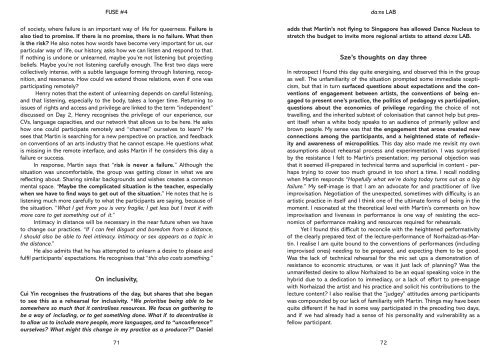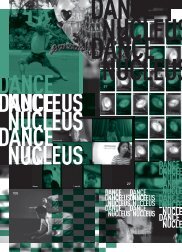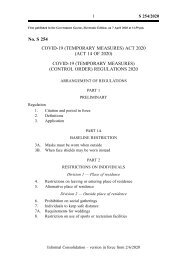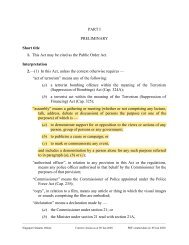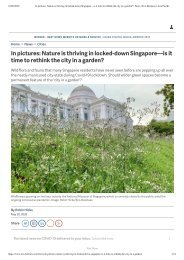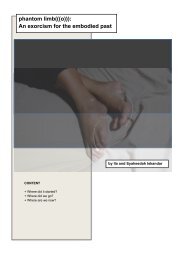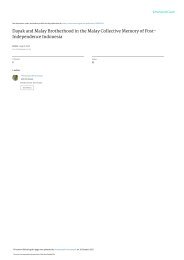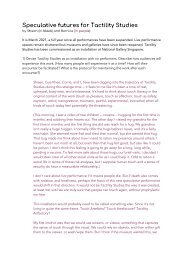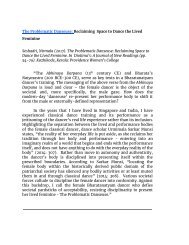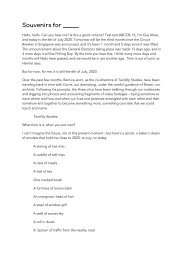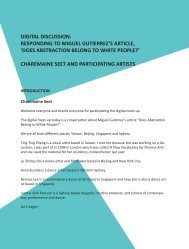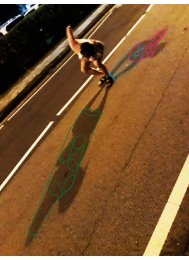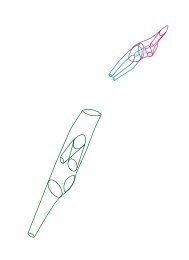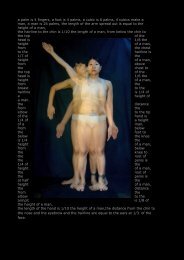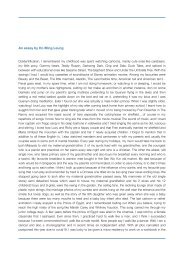FUSE#4
FUSE is a bi-annual publication that documents the projects at Dance Nucleus .
FUSE is a bi-annual publication that documents the projects at Dance Nucleus .
You also want an ePaper? Increase the reach of your titles
YUMPU automatically turns print PDFs into web optimized ePapers that Google loves.
FUSE #4<br />
of society, where failure is an important way of life for queerness. Failure is<br />
also tied to promise. If there is no promise, there is no failure. What then<br />
is the risk? He also notes how words have become very important for us, our<br />
particular way of life, our history, asks how we can listen and respond to that.<br />
If nothing is undone or unlearned, maybe you’re not listening but projecting<br />
beliefs. Maybe you’re not listening carefully enough. The first two days were<br />
collectively intense, with a subtle language forming through listening, recognition,<br />
and resonance. How could we extend those relations, even if one was<br />
participating remotely?<br />
Henry notes that the extent of unlearning depends on careful listening,<br />
and that listening, especially to the body, takes a longer time. Returning to<br />
issues of rights and access and privilege are linked to the term “independent”<br />
discussed on Day 2, Henry recognises the privilege of our experience, our<br />
CVs, language capacities, and our network that allows us to be here. He asks<br />
how one could participate remotely and “channel” ourselves to learn? He<br />
sees that Martin is searching for a new perspective on practice, and feedback<br />
on conventions of an arts industry that he cannot escape. He questions what<br />
is missing in the remote interface, and asks Martin if he considers this day a<br />
failure or success.<br />
In response, Martin says that “risk is never a failure.” Although the<br />
situation was uncomfortable, the group was getting closer in what we are<br />
reflecting about. Sharing similar backgrounds and wishes creates a common<br />
mental space. “Maybe the complicated situation is the teacher, especially<br />
when we have to find ways to get out of the situation.” He notes that he is<br />
listening much more carefully to what the participants are saying, because of<br />
the situation. “What I get from you is very fragile; I get less but I treat it with<br />
more care to get something out of it.”<br />
Intimacy in distance will be necessary in the near future when we have<br />
to change our practices. “If I can feel disgust and boredom from a distance,<br />
I should also be able to feel intimacy. Intimacy or sex appears as a topic in<br />
the distance.”<br />
He also admits that he has attempted to unlearn a desire to please and<br />
fulfil participants’ expectations. He recognises that “this also costs something.”<br />
On inclusivity,<br />
Cui Yin recognises the frustrations of the day, but shares that she began<br />
to see this as a rehearsal for inclusivity. “We prioritise being able to be<br />
somewhere so much that it centralises resources. We focus on gathering to<br />
be a way of including, or to get something done. What if to decentralise is<br />
to allow us to include more people, more languages, and to “unconference”<br />
ourselves? What might this change in my practice as a producer?” Daniel<br />
da:ns LAB<br />
adds that Martin’s not flying to Singapore has allowed Dance Nucleus to<br />
stretch the budget to invite more regional artists to attend da:ns LAB.<br />
Sze’s thoughts on day three<br />
In retrospect I found this day quite energising, and observed this in the group<br />
as well. The unfamiliarity of the situation prompted some immediate scepticism,<br />
but that in turn surfaced questions about expectations and the conventions<br />
of engagement between artists, the conventions of being engaged<br />
to present one’s practice, the politics of pedagogy vs participation,<br />
questions about the economics of privilege regarding the choice of not<br />
travelling, and the inherited subtext of colonisation that cannot help but present<br />
itself when a white body speaks to an audience of primarily yellow and<br />
brown people. My sense was that the engagement that arose created new<br />
connections among the participants, and a heightened state of reflexivity<br />
and awareness of micropolitics. This day also made me revisit my own<br />
assumptions about rehearsal process and experimentation. I was surprised<br />
by the resistance I felt to Martin’s presentation; my personal objection was<br />
that it seemed ill-prepared in technical terms and superficial in content - perhaps<br />
trying to cover too much ground in too short a time. I recall nodding<br />
when Martin responds “Hopefully what we’re doing today turns out as a big<br />
failure.” My self-image is that I am an advocate for and practitioner of live<br />
improvisation. Negotiation of the unexpected, sometimes with difficulty, is an<br />
artistic practice in itself and I think one of the ultimate forms of being in the<br />
moment. I resonated at the theoretical level with Martin’s comments on how<br />
improvisation and liveness in performance is one way of resisting the economics<br />
of performance making and resources required for rehearsals.<br />
Yet I found this difficult to reconcile with the heightened performativity<br />
of the clearly prepared text of the lecture-performance of Norhaizad-as-Martin.<br />
I realise I am quite bound to the conventions of performances (including<br />
improvised ones) needing to be prepared, and expecting them to be good.<br />
Was the lack of technical rehearsal for the mic set ups a demonstration of<br />
resistance to economic structures, or was it just lack of planning? Was the<br />
unmanifested desire to allow Norhaized to be an equal speaking voice in the<br />
hybrid due to a dedication to immediacy, or a lack of effort to pre-engage<br />
with Norhaizad the artist and his practice and solicit his contributions to the<br />
lecture content? I also realise that the “judgey” attitudes among participants<br />
was compounded by our lack of familiarity with Martin. Things may have been<br />
quite different if he had in some way participated in the preceding two days,<br />
and if we had already had a sense of his personality and vulnerability as a<br />
fellow participant.<br />
71 72


